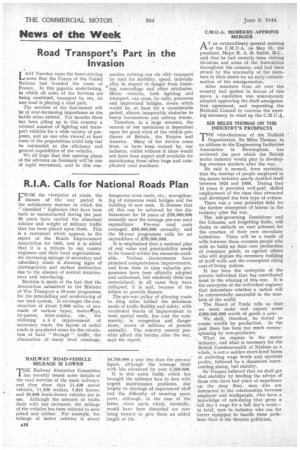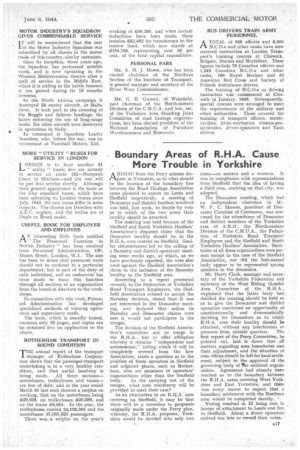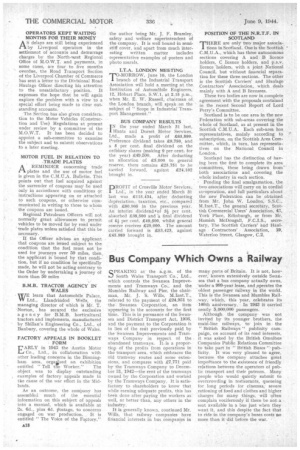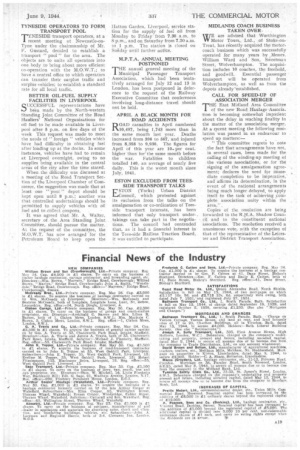RAILWAY ROAD-VEHICLE MILEAGE IS LOWER •
Page 18

Page 19

Page 20

Page 21

If you've noticed an error in this article please click here to report it so we can fix it.
THE Railway Executive Committee has recently issued some details, of the road services of the main railways, and they show that 11,438 motor vehicles, 11,339 trailers, 7,831 horses, and 20,658 horse-drawn vehicles are in use. Althcugh the amount of traffic dealt with has increased, the mileage. of the vehicles has been reduced to save petrol and rubber: For exaratile, the mileage. of motor vehicles is about 16,750,000 a year less than the pre-war. figure, althoughthe tonnage • dealt with has advanced by over 2,350,000.
It is this extra traffic which has brought the railways face to face with urgent maintenance problems, due largely to shortage of experienced staff and the difficulty of securing spare parts, although, in the case of the latter, worn parts which, normally, would have been discarded are now being 'treated to give them an added length of life. ' C.M.U.A. MEMBERS APPROVE MERGER
AT an extraordinary general meeting of the C.M.U.A. on May 31, the president, Major R. A. B. Smith, M.C., said that he had recently been visiting divisions and areas ofthe Association throughout the country, and had been struck by the unanimity of the members in their desire for an early consum
mation of the amalgamation. • After members from all over the country had spoken in favour of this move, a resolution was unanimously adopted approving the draft amalgamation agreement, and requesting the National Council to convene the meeting necessary to wind up the C.M.U4.
SIR MILES THOMAS ON THE INDUSTRY'S PROSPECTS
er'flE vice-chairman of the Nuffield 1 Organization, Sir Miles Thomas, in an address to the Engineering Inthistries Association in Birmingham, has reviewed the part. which the British Motor industry would play in developing overseas markets after the war.
He said it seemed, from statistics, that the nunalsr of people employed in the motor industry nearly doubled itself between 1924 and 1938. During that 14 years it provided well-paid, skilled employment of the class that attracted and developed the best type of artisan.
There was a vast potential field for the further absorption of labour in the industry after the war, The self-governing Dominions and the Colonies, not forgetting India, will desire to embark on vast schemes for the creation of their own secondary industries. There will be a tussle of wills between those overseas people who wish tobuild up their own production of Consumer goods, as against others who Will deplore the necessary building of tariff walls and the consequent rising cost-of-living indices.
It has been the enterprise of the private individual that has contributed most to the winning of this war. It is the enterprise of the individual engineer that determines whether a natiOn will be commercially successful in the markets of the world.
The Board of Trade tells us that we must make and export some R350,000,000 worth of goods a year.
We shall, therefore, be forced to create wealth by production. In the past there has been too much moneyspinning by non-producers. , What we require in the motor industry', and what is necessary for the British Commonwealth of Nations as a whole, is not a sudden short-lived boom of rocketing wage levels and spurious profits, followed by a disastrous heartrending slump, but stabilty. Sir Thomas believed that we shall get that stability by heeding the advice of those who have had yerars of experience on the shop floor, men who are instructed in the relationships between employer and workpeople, who have a knowledge of rate-fixing that gives a =full day's wage for a full day's work— in brief, men in industry who are far better equipped to handle these problems than is the theorist politician. MOTOR INDUSTRY'S SQUADRON GIVES COMMENDABLE SERVICE
I T will be remembered that the cost
• of the Motor Industry Squadron was subscribed by all classes in the motor trade of this country, also by motorists.
Since its inception, three years ago, the Squadron has performed notable work, and is now operating in the Western Mediterranean theatre after, a spell of service in the Middle East, where it is adding to the battle honours it has gained during its 18 months overseas.
In the North African campaign it destroyed 24 enemy aircraft, at Malta three. It took part in the covering of the Reggio and Salerno landings, the latter enforcing the use of long-range tanks. Six other aircraft were destroyed in operations in Sicily.
In command . is Squadron Leader Saunders, who, before the war, was an iccountant at Vauxhall Motors, •Ltd.
MORE " UTILITY " BUSES FOR SERVICE IN LONDON
ONDON is to have another 01 " utility " buses; five are already in service on route 152—Hampton Court to Mitcham—and the rest will be put into service shortly. Although their general appearance is the same as the Guy standard buses, which have been operating on London routes since July, 1943, the new buses differ in some respects. The chassis are Daimlers with A.E.C. engines, and the bodies are of Duple or Brush make.
USEFUL BOOK FOR EMPLOYER AND EMPLOYEE N interesting little book entitled "The Personnel Function • in British .Industry " has been received from Personnel Administration, 130, Mount Street, London,. W.1. The aim has been to stress that"personnel work should not be confined to a particular department, but is part of the duty of each individual, and an endeavour has been made to trace this function through all sections of an organization from the board of directors to the workshops.
In connection with this work, Personnel Administration has developed specialized methods of training operatives and supervisory staffs.
The book, which is soundly bound, contains only 19 pages, and copies can be obtained free on application to the above.
ROTHERHAM TRANSPORT IN SOUND CONDMON
THE annual report of the transport 1 manager of Rotherham. Corporation shows that the pa_ssenger-transport undertaking is in a very healthy condition, and that useful headway is being made. All three sections— motorbuses, trolleybuses and trams— are free of debt, and in the year ended March 31 last each showed a surplus on working, that on the motorbuses being £29,834, on trolleybuses £20,396, and on the trams £9,054. In the year, the trolleybuses carried 23,120,005 and the motorbuses 17,fir-4,523 passengers.
There was a surplus on the year's working of £59,285, and when certain deductions have been made, there remains £52,692 for transference to the reserve fund, which now stands at £154.738, representing over 30 per cent, of the total capital expenditure.
PERSONAL PARS
MR. A. H. J. BowsF, who has been elected chairman of the Northern Section of the Institute of Transport, is general manager and secretary of the River Wear Commissioners.
MR. G. E. GILBEY, of Wakefield, past chairman of the North-eastern Division of the C.M.U.A. and hon. sec. of the Yorkshire Area Standing Joint Committee of road haulage organizations, has been elected president of the National Association of Furniture Warehousemen and Removers.
BUS DRIVERS TRAIN ARMY PERSONNEL
A TOTAL of 500 officers and 8,900 tt N.C.O.s and other ranks have now received instruction at London Transport's training centres at Chiswick, Reigate, Staines and Northtleet. These figures include 79 Canadian officers and 1,242 Canadian N.C.O.s and other ranks, 100 Royal Marines and 62 American Red Cross and Society of Friends Ambulance drivers.
The training of N.C.O.s as driving instructors was commenced at Chiswick in January, 1940, Subsequently, special. courses were arranged to meet the requirements of the military and other authorities. These covered the training of transport officers, motorcyclists, fitter-mechanics, cinema-projectionists, driver-operators and Tank drivers_
OPERATORS KEPT WAITING MONTHS FOR THEIR MONEY
AS delays are still being experienced by Liverpool operators in the settlement of accounts and demurrage charges by the North-west Regional Office of M.O.W.T. and payments, in some cases, are four to five months overdue, the Road Transport Section of the Liverpool Chamber of Commerce has sent a letter to the Divisional Road Haulage Officer, directing his attention to the unsatisfactory position. It expresses the hope that he wilt again explore the problem with a view to a special effort being made to clear outstanding accounts.
The Section has also given considera tion to the Motor Vehicles (Construction and Use) Regulations at present under review. by a committee of the M.O.W.T. It has been decided to appoint a sub-committee to examine the subject and to submit observations to a later meeting.
MOTOR FUEL IN RELATION TO . .TRADE PLATES
L-1 A REMINDER concerning trade plates arid the use of motor fuel is given in the C.M.U,A. Bulletin. This points out that fuel acquired against' the surrender of coupons may he used only in. accordance with conditions atinstruCtions appearing on or attached to such coupons, or otherwise communicated in writing to those to whom the coupons are issued.
Regional Petroleum Officers will not normally grant allowances to permit vehicles to be moved far by road under trade plates unless satisfied that this be necessary.
• If the Officer advises an applicant that coupons are issued subject to the condition that the fuel must not 'be used for journeys over 50 miles, then. the applicant is bound by that condition, but if no condition be specifically made, he will not be acting contrary to the Order by undertaking a journey of more than 50 miles. .
B.M.B. TRACTOR AGENCY IN WALES
WE learn that Automobile Palace, Ltd., Llandrinclod Wells, the managing director of which is Mr. T. 'Norton, . has secured the exclusive agency for • B.M.B. horticultural tractors and implements, .manufactured by Shillan's Engineering Co., Ltd., of Banbury, covering the whole of Wales. FACTORY APPEALS IN BOOKLET
FORM
EARLY in 1943 the 'Austin Motor Co., Ltd., in collaboration with other leading concerns in the Birmingham area, orgaii-xed an exhibition entitled " Tell tffe Worker." • The object . was to display outstanding examples of factory appeals made in are cause of the war effort in the-Midlands.
As an outcome, the company has assembled much of the essential information on this subject of appeals into a manual, which is available at 2s. 6d., plus 4d, postage, to concerns engaged on war production. It is entitled " The Voice of the Factory," the author being Mr. J. F. Bramley, safety and welfare superintendent of the Company. It is well bound in. semistiff cover, and apart from much interesting written matter includes representative examples of posters and photo murals,
I.T.A. LONDON MEETING 'TO-MORROW, June 10, the London 1 branch of the Industrial Transport Association will hold a meeting at the Institution of Autorreebile Engineers, 12, Hobart Place, S.W.1, at 2.15 p.m., when Mr. E. W. Russell, chairman of. the London branch, will speak on the subject of " Scope in Industrial-Transport Management."
BUS COMPANY RESULTS IN the year ended March 31 last,
Hants and Dorset Motor Services, Ltd., made a profit of £65,899. Preference dividend takes £9,750, and a 5 per cent, final dividend on the ordinary Shares (making 9. per cent: for the year) £49,500. After deducting an allocation of £5,000 to general reserve, there remains £25,751 to be carried forward, against £24,102 brought in.
DROFIT of Crosville Motor Services, .1. Ltd., in the year ended March 31 last was £115,434, after deducting depreciation,, taxation, etc., compared with £80,905 in the previous year. An interim dividend•of 31 per cent. absorbed £38,500 and a final dividend of 41 per cent. £49,500, whilst general reserve receives £20,000. The amount carried forward is £53,423, against £45 , 989 brought in. POSITION OF THE N.R.T.F. IN SCOTLAND
THERE are only two major associations in Scotland. One is the Scottish C.M.U.A.,.which has three autonomous sections covering A and B licence
holders, C licence holders, and p.s.v.
licence 'holders, with a joint National Council, but without financial separa.tion for these three sections. The other isthe Scottish Carriers' . and Haulage .Contractors' -Association, which deals mainly with A and. B licensees.
These two bodies are now in complete agreement with the proposals contained in the .recent Second Report of Lord Perry's Committee.
Scotland is to be one area in the new Federation with sub-areas covering the whole of Scotland, as at present in the Scottish C.M.U.A. Each sub-area has representatives, mainly according to subscription, on the Scottish Area Committee, which, in turn, has representatives on the National Council in London.
Scotland has the distinction of hav ing been the first to complete its area . committeeS, these being drawn from'
.both associations and covering the whole industry in each section.
Pending the final amalgamation, the two associations will carry on in cordial co-operation, and full particulars about the new Federation can be obtained from Mr. John W. Loudon, S.S.C., M.Inst.T., the general secretary, Scottish Commercial Users' Association, 43, York Place, Edinburgh, or from Mr. .Hamish McDougall, F.C.I.S., secretary, The Scottish Carriers' ancl Haulage Contractor' Association, 19: Waterloo Street, Glasgow, C.2.
TYNESIDE OPERATORS TO FORM. TRANSPORT POOL TYNESIDE transport operators. at a 1 recent meeting at Newcastle-onTyne under the chairmanship of Mr. F. Gustard, decided to establish a transport " pool " for the area. The objects are, to unite all operators into one body to bring about more efficient co-operation with the M.O.W.T,; to have 6. central office to which operators can transfer their surplus traffic and surplus vehicles; to'establish a standard rate for all local traffic.
BETTER OIL-FUELSUPPLY FACILITIES IN LIVERPOOL SUCCESSFUL representations have been made by th.e North-westeen Standing Joint Committee of the Road Hauliers.' National Organizations for oil fuel to be made available in Liverpool after 5 p.m. on five days of the week This request Was made to meet the needs of " foreign " vehicles which have had difficulty in obtaining fuel after loading up at the deck-s. In some instances, vehicles have had to remain at Liverpool, overnight, owing to no supplies being available in the •central areas of the city after the time stated.
When the difficulty *as discussed at a meeting of the Road Transport Section of the Liverpool Chamber of Commerce, the suggestion was made that at least one " pool " depot should be kept open until 8 p.m.; another was that controlled undertakings should be permitted to supply vehicles with oil fuel and to c011eet coupons.
It was agreed that Mr. A. Walter, secretary of the Area .Standing Joint. Committee, should pursue the matter. At the request of the committee, the M.0,W.T, has now arranged for the Petroleum Board to keep open the Hatton Garden, Liverpool, service station for the supply of fuel oil from Monday to Friday from 7.30 a.m. to 8 p.m., and on Saturday from 7.30 am. to 1 p.m. The station is closed on Suiiday until further notice.
M.P.T.A. ANNUAL MEETING POSTPONED THE annual general meeting of the Municipal Passenger Transport Association, which had been tentatively arranged for July 12 and 13 in London, has been postponed in deference to the request of the Railway Executive Committee that conferences involving long-distance travel should not be held.
APRIL A BLACK MONTH FOR ROAD ACCIDENTS
ROAD casualties in April numbered 10,497, being 1,743 more than in the same month last year. Deaths increased from 396 to 567, and injured from 8,358 to 9,930. The figures for April of this year are 1lh per cent. higher thanfor' thesame month before the war. Fatalities to children totalled 140, an average of nearly five daily. This is the worst month since July, 1941.
ESTON EXCLUDED FROM TEES SIDE TRANSPORT TALKS STON (Yorks) Urban District
uncil, which protested against its exclusion from the talks on the amalgamation or co-ordination of TeesSide transport interests, has been informed that only transport undertakings can :take part in the negotiations. The council had contended that, as it had a • financial interest in the Tees-side Railless Traction Board, it Was entitled to participate.
MIDLANDS COACH BUSINESS TAKEN OVER.
WE are advised that Worthington Motor Tours, Ltd., of Stoke-oeTrent, has r&ently acquired the motorcoach business which was successfully operated for many years by ,Messrs. William Ward and Son, Sveeetman Street, Wolverhampton. The acquisition includes 10 coaches, the freehold, and goodwill. Essential passenger transport will be operated from Wolverhampton, as well as from the depots already "established.
CALL FOR SPEED-UP OF ASSOCIATION MERGER
THE East Midland Area Committee of the new Road Haulage 'Association is becoming somewhat impatient about the delay in reaching finality in the matter of the association merger. At a recent meeting the following resolution was passed in. ail endeavour to speed up matters: " This committee regrets to note the fact that arrangements have not, in several cases, been made for the . calling of the winding-up meeting of the various associations, or for the signing of the amalgamation agreemeatdeclares declares the need for immediate completion to be imperative, and affirms its determination, in the event of the national arrangements being much longer delayed, to apply itself to the task of achieving complete association unity within the area.".
Copies of the resolution are being forwarded to the R.tf.A. Shadow Council and to the constituent national associations. The resolution receive-cl unanimous vote, with the exception of that of the representative of the Leicester and District Transport Association.




















































